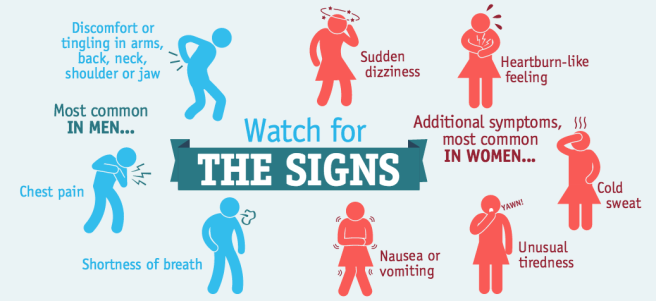
In India out of every 4 deaths, one is due to heart disease ( 25%). A larger percent of population suffers from variety of heart ailments. Diseases under the heart disease umbrella include blood vessel diseases, such as coronary artery disease which are the commonest; heart rhythm problems (arrhythmias); disease of heart muscle ( cardiomyopathy), defects of heart valves, and heart defects you’re born with (congenital heart defects), etc.
Disease of blood vessel which is also called as atherosclerosis affects vessel in any part of the body and produce variety of symptoms : heart- heart attack/ myocardia infarction, legs: gangrene, brain: stroke, intestine: gangrene etc.
Many forms of heart disease can be prevented or treated with healthy lifestyle choices.
Symptoms

Heart disease symptoms depend on what type of heart disease you have.
Narrowing of blood vessel of heart : (atherosclerotic disease)
Heart is a constantly working organ and it can not tolerate even slightest decrease in blood supply. Atherosclerosis produces narrowing of blood vessels and decreases blood supply. Symptoms depend upon the rate at which narrowing occurs.
Symptoms can include:

- Chest pain, chest tightness, chest pressure and chest discomfort (angina) on walking or exertion. Diagram shows various sites where heart pain is can be felt.
- Shortness of breath on exertion
- Pain, numbness, weakness or coldness in your legs or arms if the blood vessels in those parts of your body are narrowed
- Symptoms may be different for men and women. For instance, men are more likely to have chest pain; women are more likely to have other symptoms along with chest discomfort, such as shortness of breath, nausea and extreme fatigue
You might not be diagnosed with cardiovascular disease until you have a heart attack, angina, stroke or heart failure. It’s important to watch for cardiovascular symptoms and discuss concerns with your doctor. Cardiovascular disease can sometimes be found early with regular evaluations.
Abnormal rate or rhythm of heart:
A heart arrhythmia is an abnormal heartbeat. Your heart may beat too quickly, too slowly or irregularly. Heart arrhythmia symptoms can include:
- Fluttering in your chest
- Racing heartbeat (tachycardia)
- Slow heartbeat (bradycardia)
- Chest pain or discomfort
- Shortness of breath
- Lightheadedness
- Dizziness
- Fainting (syncope) or near fainting
Heart disease symptoms caused by abnormal heart muscle (dilated/ hypertrophic/ restrictive cardiomyopathy)
In early stages of cardiomyopathy, you may have no symptoms. As the condition worsens, symptoms may include
- Breathlessness with exertion or at rest
- Swelling of the legs, ankles and feet
- Fatigue
- Irregular heartbeats that feel rapid, pounding or fluttering
- Dizziness, lightheadedness and fainting
- Syncope
- Sudden death
Heart disease symptoms caused by heart infections
Endocarditis is an infection that affects the inner membrane that separates the chambers and valves of the heart (endocardium). Heart infection symptoms can include
- Fever
- Shortness of breath
- Weakness or fatigue
- Swelling in your legs or abdomen
- Changes in your heart rhythm
- Dry or persistent cough
- Skin rashes or unusual spots
Heart disease symptoms caused by valvular heart disease
The heart has four valves — the aortic, mitral, pulmonary and tricuspid valves — that open and close to direct blood flow through your heart. Valves may be damaged by a variety of conditions leading to narrowing (stenosis), leaking (regurgitation or insufficiency) or improper closing (prolapse).
Depending on which valve isn’t working properly, valvular heart disease symptoms generally include:
- Fatigue
- Shortness of breath
- Irregular heartbeat
- Swollen feet or ankles
- Chest pain
- Fainting (syncope)
When to see a doctor
Seek emergency medical care if you have these heart disease symptoms:
- Chest pain
- Shortness of breath
- Fainting
Heart disease is easier to treat when detected early, so talk to your doctor about your concerns regarding your heart health. If you’re concerned about developing heart disease, talk to your doctor about steps you can take to reduce your heart disease risk. This is especially important if you have a family history of heart disease.
If you think you may have heart disease, based on new signs or symptoms you’re having, make an appointment to see your doctor.

REPLY COMMENT